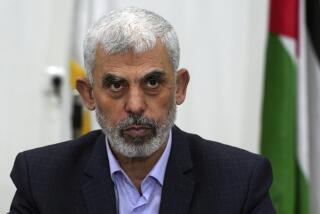Bin Laden’s No. 2 is Al Qaeda’s new chief
- Share via
Reporting from Washington — In July 2005, Al Qaeda second-in-command Ayman Zawahiri sent a long letter to the group’s lead operative in Iraq, urging him to tone down his activities.
In Iraq, Abu Musab Zarqawi had been orchestrating suicide bombings of Shiite Muslim shrines. His followers frequently videotaped the beheading of hostages. Zawahiri, an Egyptian doctor who helped organize the Sept. 11 terrorist attacks in the U.S. and other violence, told Zarqawi he was going too far.
“We are in a media battle, in a race for the hearts and minds” of Muslims, wrote Zawahiri, who was named Thursday to succeed Osama bin Laden as Al Qaeda’s leader. And most Muslims “will never find [such tactics] palatable.”
Zarqawi didn’t heed the counsel, and a year later he was killed in a U.S. airstrike, aided by some of his growing number of enemies. If the attempt to rein him in revealed Zawahiri as a canny strategist, it also illustrated how little control Al Qaeda’s leaders had over their affiliates even then.
Zawahiri, who has a $25-million American bounty on his head, will be looking to launch a major strike to prove himself and avenge Bin Laden, say U.S. officials and terrorism experts. But he may find the organization even more difficult to manage.
Al Qaeda and its offshoots have further splintered, Zawahiri lacks Bin Laden’s charisma, and the U.S. drone campaign in Pakistan, where Zawahiri is presumed to be hiding, will make it more difficult for him to communicate, said Daniel Byman, director of research at the Brookings Institution’s Saban Center for Middle East Policy, a Washington think tank.
“It’s an organization prone to division. You have multiple power centers. There is a significant disagreement on priorities. And while he’s been in the terrorism business for 40 years, no one ever used the word ‘charisma’ in talking about Zawahiri,” Byman said.
U.S. officials said they believe the Al Qaeda announcement Thursday was authentic, but they downplayed its importance.
“Frankly, it barely matters,” State Department spokeswoman Victoria Nuland told reporters.
A U.S. counter-terrorism official said Al Qaeda members are not as devoted to Zawahiri as they were to Bin Laden, which will make it harder for him to lead.
Some experts say that could initially make him more dangerous.
“Zawahiri will certainly try to prove his bona fides by pushing for attacks and reprisals while finding ways of taking advantage of the chaos and disillusionment resulting from the Arab Spring — with a focus no doubt on Egypt,” said Juan Zarate, who was counter-terrorism advisor to President George W. Bush.
Bruce Hoffman, a terrorism expert at Georgetown University, agreed that Zawahiri lacks Bin Laden’s personality. “But don’t you think that the No. 1 issue on Zawahiri’s agenda is to pull off a big, bloody attack?”
A scion of an upper-middle-class family, Zawahiri, 59, joined the Muslim Brotherhood at 14, and at 15 he formed a more radical underground organization. In the 1970s, he served three years as a surgeon in the Egyptian army.
When Islamic militants assassinated Egyptian President Anwar Sadat in 1981, Zawahiri was arrested, but authorities couldn’t prove his role in the plot, and he was released. He linked up with Bin Laden in Pakistan, where he was running a group helping fight the Soviet occupation of Afghanistan.
“Accounts of Zawahiri’s life from family friends and prison cellmates paint him as an awkward, withdrawn, disputatious man of little grace and much violence,” wrote Steve Coll in “Ghost Wars,” his 2004 history of Al Qaeda.
After the war Zawahiri followed Bin Laden to Sudan and then back to Afghanistan, where they were sheltered by the Taliban regime. They planned the 1998 bombings of U.S. embassies in East Africa, the 2000 suicide bombing of the U.S. destroyer Cole off the coast of Yemen and the attacks on Sept. 11, 2001.
Their stated goal is to establish a caliphate to impose their version of Islam over all Muslim countries. Because the U.S. backed Israel and what they considered apostate Arab regimes, Americans were their enemy.
In a 2001 document, Zawahiri said it was Al Qaeda’s intent to kill as many Americans as possible. In the aftermath of the Sept. 11 attacks, a U.S. airstrike in Afghanistan killed one of his wives, a son and a daughter. Zawahiri makes reference to that incident in his letter to Zarqawi, saying he had “tasted the bitterness of American brutality.”
In a video he posted after Bin Laden’s death, he vowed revenge on the United States, arguing that the killing would spark a “jihadist renaissance.”
Al Qaeda’s approval ratings are low across many Muslim countries, ranging from 3% in Lebanon to 28% in the Palestinian territories, according to a May 17 poll by the Pew Research Center’s Global Attitudes Project. And the pro-democracy movements of the “Arab Spring” seem worlds away from Al Qaeda’s ideology.
Still, it would take only another successful attack to reestablish Al Qaeda as a serious threat, Hoffman said.
“They may be a lot weaker, but they pin their faith and hope on pulling off a successful operation,” he said. “Hopefully we can deprive them of that, but I would say, under a new leader, the threat they pose is still considerable.”
Amro Hassan of The Times’ Cairo bureau contributed to this report.
More to Read
Sign up for Essential California
The most important California stories and recommendations in your inbox every morning.
You may occasionally receive promotional content from the Los Angeles Times.











